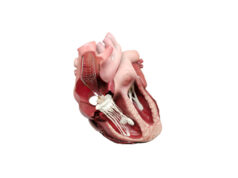A report published recently provides evidence that the symptoms of depressive disorder are causally associated with the risk of coronary heart disease, and as such should be considered a potentially modifiable risk factor for the occurrence of coronary heart disease.
The findings, from the Whitehall II study of more than 10,000 civil servants in the UK, are published in the European Journal of Preventive Cardiology.
The Whitehall II study began in 1985-88 when the health of 10,308 civil servants working in 20 London-based departments was assessed by clinical examination and the 30-item General Health Questionnaire. Subsequent assessments were made every two-to-three years, with “exposure” to depression measured on six occasions over the 20-year study period. All participants were followed for major coronary heart disease events and stroke.
According to a press release, results over the five-year observation cycles showed a cumulative effect of depressive symptoms on the risk of coronary heart disease consistent with an increasing dose-response. Thus, there was no added risk of coronary heart disease among those who showed evidence of depressive symptoms during one or two of the questionnaire assessments, but a 100% increase in risk in those who reported symptoms at three or four of the assessments.
However, the association of depressive symptoms with stroke was only apparent with short follow-up, suggesting that this association was an effect of reverse causation.
“In other words,” says investigator Eric Brunner, Department of Epidemiology and Public Health, University College London, UK, “depressive symptoms may be a sign of imminent stroke, but are not causally related.” In addition, there was no evidence over the full study period of any dose-response effect with stroke. Both these findings, Brunner says, suggest that in the case of stroke the depressive symptoms are a consequence of vascular disease, not its cause.
Thus, say the authors: “This finding provides evidence supporting a causal relationship between depression and coronary heart disease, in contrast to the findings in relation to stroke.”
Dr Brunner adds: “European prevention guidelines refer to depression as a coronary risk factor, and in our study repeated episodes of depressive symptoms accounted for 10% of all CHD events in the study population. However, this figure relies on the strong assumption of a direct causal mechanism. Whether or not the association is causal, supporting individuals to recover from chronic or repeated episodes of depression has merit, particularly if the individual is then better able to reduce any vascular risk, for example by quitting smoking.”
In considering an explanation for the different effect of depression on stroke and CHD risk, Dr Brunner proposed a possible effect of blood pressure.
“Depressive symptoms have been linked with low blood pressure,” he said, “and this linkage will tend to confound the association between depression and stroke.”













